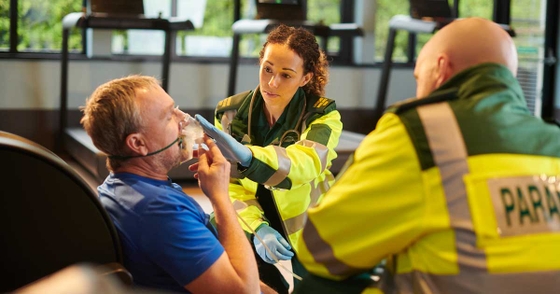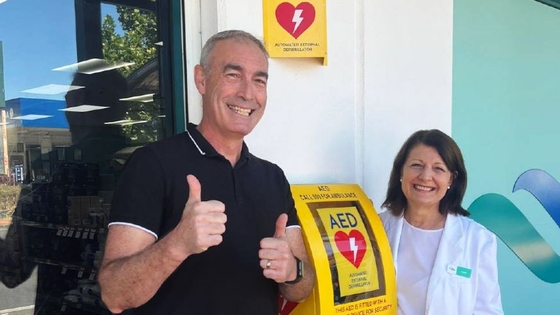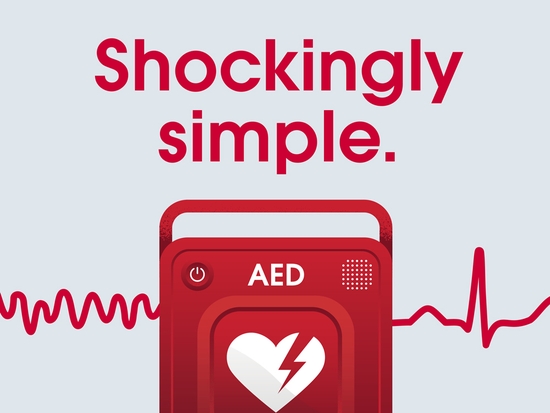.jpg?format=pjpg&auto=webp)
What is a cardiac arrest?
⚠️Call Triple Zero (000) immediately if you think someone is having a heart attack or is in cardiac arrest.
What is a sudden cardiac arrest ?
For someone in cardiac arrest, every minute counts. Know what you can do to help save a life.
Key takeaways
5 min read
- A cardiac arrest is when the heart suddenly stops beating, cutting off oxygen to the brain and vital organs.
- A person in cardiac arrest will be unresponsive and not breathing normally.
- A cardiac arrest is a medical emergency.
- Urgent action from a bystander can help save a life.
- Anyone can help someone who is in cardiac arrest by following Call, Push, Shock.
How can I help someone in cardiac arrest?
If you think someone is in cardiac arrest, follow Call, Push, Shock:
1. Call Triple Zero (000)
Call emergency services immediately. The operator will guide you through CPR and how to use an AED.
2. Push – start CPR
Press hard and fast in the centre of the chest (100–120 compressions per minute). Do not stop until help arrives or an AED becomes available.
3. Shock – use an automated external defibrillator
- Apply an AED as soon as possible.
- AEDs provide clear voice instructions—no training is needed to use one.
- You cannot harm the person—the AED will only deliver a shock if necessary.
Any attempt at resuscitation is better than none.
What causes a sudden cardiac arrest?
Cardiac arrest is usually caused by an electrical malfunction in the heart. Common causes include:
- coronary heart disease (the most common cause)
- trauma or injury
- drowning or choking
- electrocution
- severe allergic reactions
Cardiac arrest can happen at any age but is more common in people over 70.
How common is sudden cardiac arrest?
- A sudden cardiac arrest can happen anywhere, at any time.
- Nearly 80% of out-of-hospital cardiac arrests occur at home.
- More than 32,000 people experience a cardiac arrest in Australia each year.
- Only around 10% survive but immediate CPR and AED use can greatly increase survival rates.
What are the signs and symptoms of a sudden cardiac arrest?
A cardiac arrest happens suddenly and rapidly. It often occurs with no warning. The person in cardiac arrest will:
- collapse and fall to the ground
- lose consciousness and become non-responsive
- not be breathing normally or not at all - it may sound like they are choking, gasping or gurgling.
What is the difference between a sudden cardiac arrest and a heart attack?
A sudden cardiac arrest is different to a heart attack. Sometimes a heart attack can lead to a sudden cardiac arrest. If you or someone is having a suspected heart attack, getting help as soon as possible can help prevent a cardiac arrest.
What is cardiopulmonary resuscitation (CPR)?
CPR is a combination of mouth-to-mouth rescue breathing and chest compressions.
CPR helps to keep blood and oxygen circulating to the brain of a person whose heart has stopped beating, until the heart can be restarted.
CPR alone does not restore a normal heart rhythm. It does help keep the heart in a state where the AED has a greater chance of being able to do its job.
Compressions-Only CPR (COCPR) is CPR without rescue breaths (also known as ‘hands only CPR’). Both types of CPR double the person’s survival rates.
Remember, any attempt at resuscitation is better than none.
What is an automated external defibrillator (AED)?
An AED is a portable device that detects life-threatening abnormal heart rhythms and delivers an electrical shock if needed.
- AEDs provide step-by-step voice instructions, so anyone can use them.
- AEDs only deliver a shock if required— an AED will not shock someone when a normal heartbeat is detected.
Having more AEDs in public places and awareness of their use can help save more lives.
What happens after a sudden cardiac arrest?
After resuscitation, your healthcare team will:
- try to identify the cause through tests including imaging, blood tests and genetic testing
- assess risk factors and check for underlying conditions for sudden cardiac arrest
- discuss treatment options to prevent future cardiac arrests.
Many survivors go on to live healthy, fulfilling lives. You might like to join our MyHeart MyLife online community to connect with people across Australia who are on a similar recovery journey.
Watch David’s cardiac arrest survivor story
References
Victoria Ambulance. Victorian Ambulance Cardiac Arrest Registry: 2021-2022 Annual Report. 2023. Available from: https://www.ambulance.vic.gov.au/wp-content/uploads/2023/03/VACAR-2021-2022-Annual-Report.pdf
Stiles MK, Wilde AAM, Abrams DJ et al. 2020 APHRS/HRS expert consensus statement on the investigation of decedents with sudden unexplained death and patients with sudden cardiac arrest, and of their families. Heart Rhythm. 2021;18(1):e1-50. doi:10.1016/j.hrthm.2020.10.010
Bray J, Howell S, Ball S et al. The epidemiology of out-of-hospital cardiac arrest in Australia and New Zealand: A binational report from the Australasian Resuscitation Outcomes Consortium (Aus-ROC). Resuscitation. 2022;172:74-83. doi: 10.1016/j.resuscitation.2022.01.011
Riva G, Ringh M, Jonsson M et al. Survival in out-of-hospital cardiac arrest after standard cardiopulmonary resuscitation or chest compressions only before arrival of emergency medical services. Circulation. 2019;139(23):2600-2609. doi: 10.1161/CIRCULATIONAHA.118.038179
Australian Resuscitation Outcomes Consortium. Annual Report. 2024. https://www.ausroc.org.au/wp-content/uploads/2025/01/Epistry-Annual-Report-2022-data-changes-07.01.25.pdf
You might also be interested in...

Heart attack vs cardiac arrest – know the difference
Learn the difference between heart attack and cardiac arrest, their symptoms, survival rates, and prevention tips to help you respond in an emergency.

Cardiac arrest: There is no training required to save a life, just a little education
Particularly in the case of sudden cardiac arrest, because this is when someone’s heart abruptly stops beating, for no apparent or obvious reason.

An AED can help save lives
Learn what an AED is and what you can do during a cardiac arrest.
Last updated25 February 2025
Last reviewed03 July 2024
